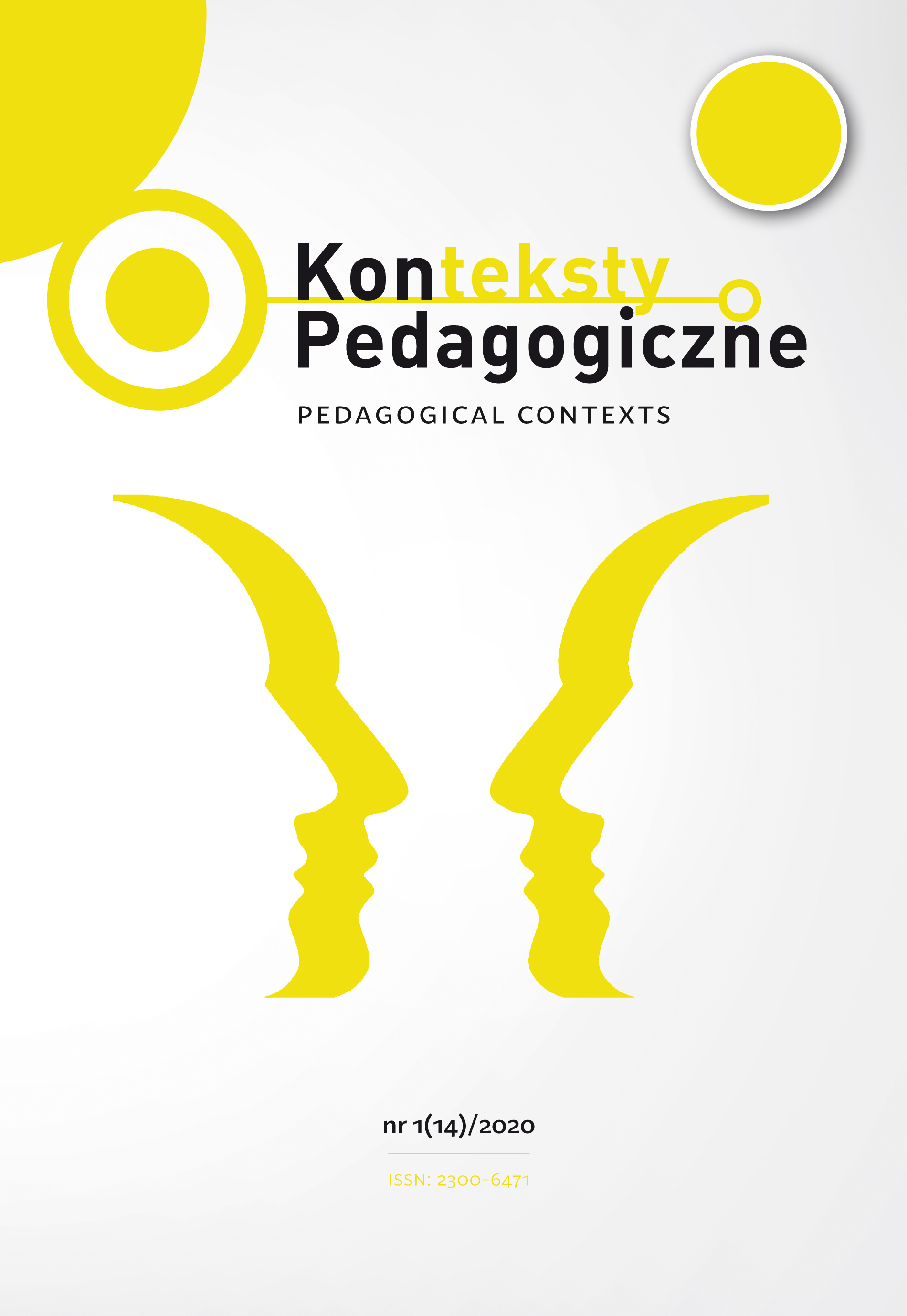Abstract
The primary objective of the research presented in this article was to determine how adult daughters, in retrospect, see the educational role of their mothers. The method applied in the research procedure involved the Wheel Questionnaire of Ben Shalit – a modified version of Perception Survey Questionnaire. The research involved 91 female students of the Faculty of Education at the University of Rzeszów. One of the assumptions of this research was that parenting constitutes a fundamental dimension of adult functioning, whose quality depends on childhood experiences. Based on the findings, it can be concluded that women see the educational role of their mothers in the context of four main categories: togetherness, values, nurture and care, and bestowing emotions.
The issue not directly resulting from the research, which is nevertheless significant from the point of view of family communication problems, is the matter of fulfilling pro-parental education both in school and public space, which should involve transmitting knowledge on the development and upbringing of a child, and intended to shape parental competencies including communication and broadly understood pedagogical culture.
References
Babbie, E. (2008). Podstawy badań społecznych [Introduction to Social Research], transl. W. Betkiewicz, M. Bucholc & P. Gadomski. Warszawa: PWN.
Bakiera, L. & Stelter, Ż. (2010). Rodzicielstwo z perspektywy rodziców dziecka pełnosprawnego i niepełnosprawnego intelektualnie [Parenthood from the Perspective of Parents of Fully-Abled and Intellectually Disabled Children]. Roczniki Socjologii Rodziny, 20, 131–151.
Cohen, S.T. (2015). Parenthood in Midlife: Perceived Parental Roles, Intergenerational Ambivalence and Well-being among Parents of Adult Children, http://www.sciencedirect. com/science/article/pii/S1877042815056165 [accessed: 20.11.2017].
Chomczyńska-Miliszkiewicz, M. (1999). Rodzicielstwo – między wiedzą a intuicją [Parenthood – between Knowledge and Intuition]. Kraków: Oficyna Wydawnicza Impuls.
Czapiński, J. (1985). “Koło” – Schalita Kwestionariusz Stylu Spostrzegania [Shalit’s “Wheel” – A Perception Survey Questionnaire]. In: E. Paszkiewicz & E. Szutrowa (eds.), Materiały do nauczania psychologii [Materials for Teaching Psychology], series III, vol. 4 (pp. 283–299). Warszawa: PWN.
Izdebska, J. (2015). Dziecko – dzieciństwo – rodzina – wychowanie rodzinne. Kategorie pedagogiki rodziny w perspektywie pedagogiki personalistycznej [Child – Childhood – Family – Family Education. Categories of Family Pedagogy in the Light of Personalistic Pedagogy]. Białystok: Niepaństwowa Wyższa Szkoła Pedagogiczna w Białymstoku.
Łobocki, M. (2004). Wybrane problemy wychowania nadal aktualne [Selected Valid Problems of Upbringing]. Lublin: UMCS.
Opozda, D. (2012). Struktura i treść jednostkowej wiedzy o wychowaniu. Studium pedagogiczne wiedzy rodziców i jej korelatów [Structure and Content of Individual Knowledge about Education. Pedagogical Study of Parents’ Knowledge and Its Correlates]. Lublin: KUL.
Ostrouch, J. (2004). Nieuchwytne. Relacje matek i córek w codzienności [The Elusive. Mother-Daughter Relations in Everyday Life]. Olsztyn: UWM.
Parysiewicz, B. (2000). Wychowanie rodzinne do roli matki [Family Education in the Role of Mother]. In: M. Chymuk & D. Topa (eds.), Edukacja prorodzinna [Pro-family Education] (pp. 205–211). Kraków: AP.
Śledzianowki, J. & Bębas, S. (2016). Blaski i cienie współczesnej rodziny polskiej [The Lights and Shadows of a Modern Polish Family]. Kielce: Jedność.
Śniegulska, A. (2017). O potrzebie edukacji do rodzicielstwa [About the Need for Education in Parenthood]. Pedagogika, 26(1), 57–67. DOI: 0.16926/p.2017.26.05.
Wilk, J. (2016). Pedagogika rodziny [Family Pedagogy]. Lublin: KUL.
Wolicki, M. (1982). Podstawowe warunki spełniania ról rodzicielskich i proces ich uczenia się [Basic Conditions for Fulfilling Parental Roles and Their Learning Process]. Problemy Rodziny, 3(124), 11–16.
In accordance with the recommendation of the Ministry of Science and Higher Education, which aims to counteract the practice of “ghostwriting” and “guest authorship,” all authors submitting their text for publication should attach an author’s statement which declares the contribution of each of the authors to the article. The printed and signed statement should be delivered by mail or other means to editor-in-chief Joanna Skibska or sent in the form of a scan to the following e-mail address: redakcja@kontekstypedagogczne.pl. The authors will not receive remuneration for publishing their papers. The editors reserve the right to make minor editorial changes to the articles which will not affect the substance of the article. We encourage all authors to prepare their articles in accordance with the guidelines for manuscript preparation. Download pdf file.
Authors transfer all copyrights and grant the journal the right of first publication with the work simultaneously licensed under a Creative Commons Attribution License that allows others to share the work with acknowledgement of the work's authorship and initial publication in this journal. All authors agree to the publishing of their email addresses, affiliations and short bio statements with their articles during the submission process.

